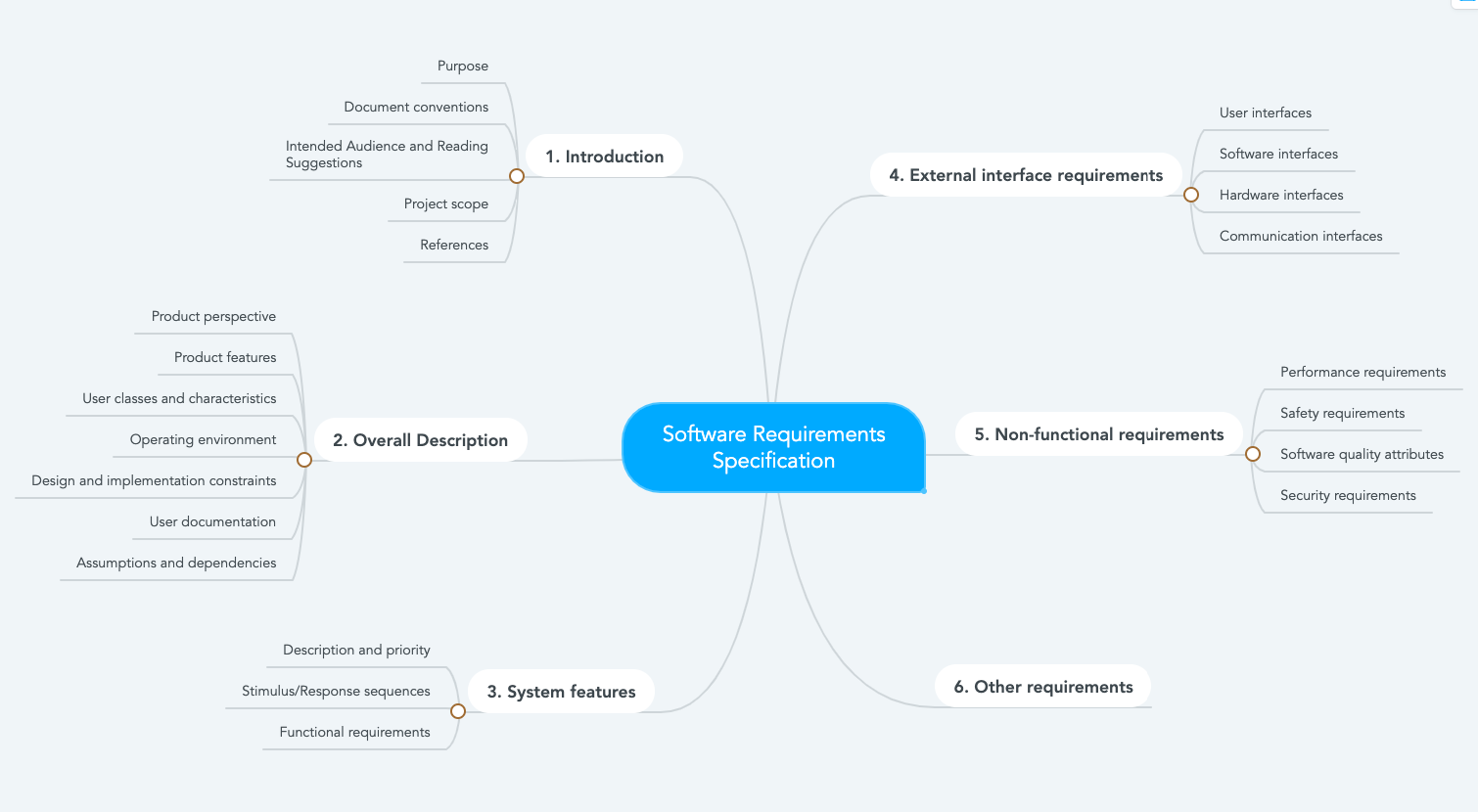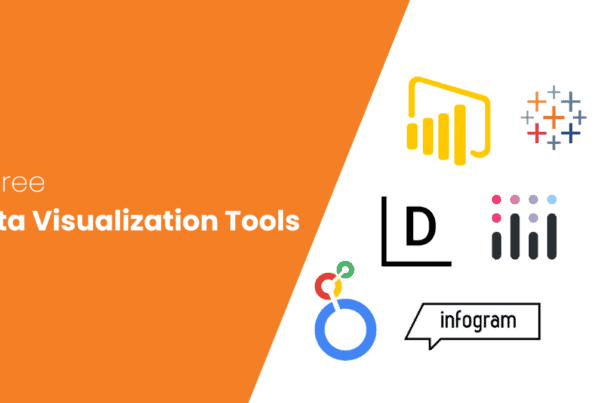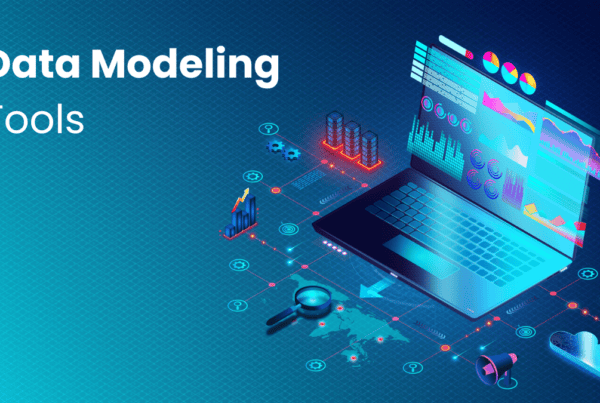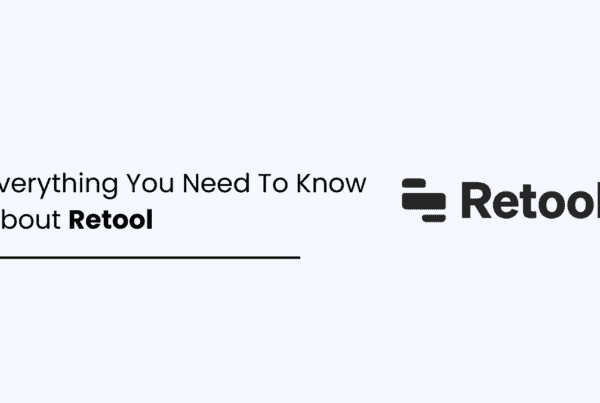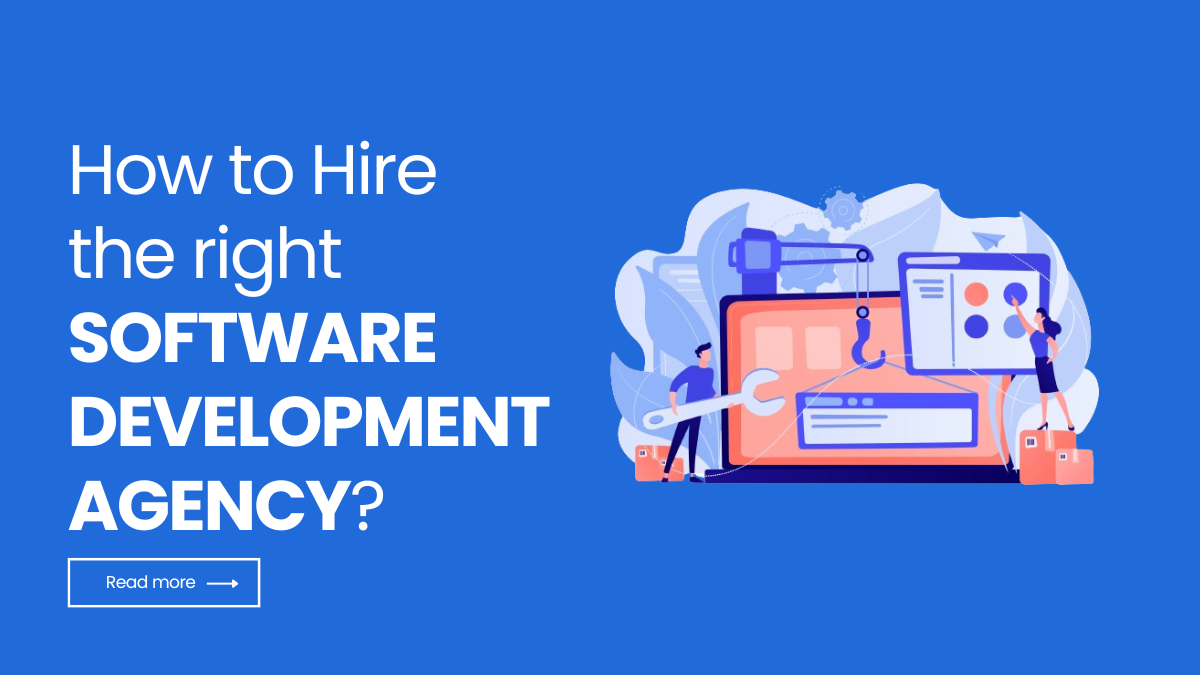
Do you want to have your own software that can make your business better, faster, and smarter? You are not alone. Many businesses today are looking for custom software development, which means creating software that is made just for them and their needs. Custom software development is a huge and growing market. According to Grand View Research, it was worth USD 29.29 billion in 2022, and it is expected to grow by 22.4% every year from 2023 to 2030.
However, creating custom software is not easy. There are many things to consider, such as what you want your software to do, how you want it to look, and how you want it to work. And you can’t do it alone. You need to find someone who can help you turn your ideas into reality. You need to find a software development agency.
In this article, I am going to provide a step-by-step guide to Hiring the Right Software Development Agency for Your Custom Software Development Project. In this guide, I am covering everything from preparing a detailed technical document to signing a contract. So, take a deep breath and dive deeper with me.
Process of Hiring the Right Software Development Agency
Here is the complete process of hiring the Right Software Development Agency for Your Custom Software Development Project:
Step 1. Understanding Your Needs
Before you start looking for a software development agency, you need to have a clear idea of what you want from your custom software project. Having clear objectives and requirements will help you:
- Communicate your vision: You will be able to explain to the software development agency what you want your software to do, how you want it to look, and how you want it to work.
- Evaluate their proposals: You will be able to compare and contrast the different software development agencies based on how well they understand and meet your needs.
- Manage your expectations: You will be able to set realistic and achievable goals for your software project and avoid disappointment or frustration.
Tips to help you identify and document your objectives
But how do you identify and document your objectives and requirements? Here are some tips to help you:
- Think about your problems and goals: You need to know what problems you want to solve with your software, and what goals you want to achieve. For example, do you want to improve your customer service, increase your sales, or streamline your operations?
- Think about your users and customers: You need to know who will use your software, and what they need and want from it. For example, do you want to make your software easy to use, attractive, or engaging for your users and customers?
- Think about your features and functionalities: You need to know what your software should be able to do, and how it should do it. For example, do you want your software to have a chatbot, a payment system, or a dashboard?
- Think about your design and style: You need to know how your software should look and feel, and how it should match your brand and identity. For example, do you want your software to have a certain color scheme, font, or layout?
Once you have thought about these aspects, you need to write them down in detail. This will help you create a document that outlines your objectives and requirements for your software project.
This document is also known as a software requirements specification (SRS), and it is a very important tool for communicating with your third-party software development agency. Below are the components of an SRS:
Importance of a requirements workshop
Sometimes, clients don’t have a written plan when they go to a company that can make software for them. They may have some ideas or hopes, but they may not know how to communicate them lucidly. This is where a workshop can help.
A workshop is a meeting between you and the third-party company that you will eventually hire to write the software, where you talk about what you need and want for your software project. The company will ask you things, hear your answers, and help you clarify your goals and needs. They will also help you prioritize features and guide you to best industry practices.
The result of a requirement workshop is a written plan that shows your dreams and hopes for your software project in a clear written format. This plan will help both you and the company and will make sure that you agree on everything during the software-making process to set proper expectations for all parties.
Step 2. Searching for Potential Agencies
Once you have a clear idea of what you want from your custom software project, you need to start looking for potential software development agencies that can help you achieve it. There are many ways to find software development agencies, such as:
Online platforms
You can use online platforms that connect clients with software development agencies, such as Clutch, GoodFirms, or Upwork. These platforms allow you to browse through different software development agencies based on their location, expertise, ratings, reviews, and portfolio. You can also contact them directly through the platform and request a quote or a proposal for your project.
Referrals
Ask your friends, colleagues, or network for referrals or recommendations of software development agencies that they have worked with or know of. This can help you find trustworthy and reliable software development agencies that have a proven track record of delivering quality software projects.
Search engines
Search engines like Google or Bing to search for software development agencies that match your criteria is also a good option. You can use keywords, filters, and modifiers to narrow down your search results and find the most relevant software development agencies for your project.
Step 3. Evaluating Your Options
After you have searched for potential software development agencies, you need to evaluate them and see which one is the best for your custom software project. There are many factors to consider when evaluating your options, I mentioned some of them in the below section.
4 Essential Factors to Consider
Some of the essential factors you should consider when evaluating your options are:
Overall Cost
You need to know how much the software development agency will charge you for your project, and how they will charge you. You need to compare their price with your budget and see if they offer a fair and reasonable value for their services. You also need to see if they have a flexible and transparent payment model, such as fixed-price, hourly-rate, or milestone-based. Never go with the cheapest options, they typically don’t have experience. In custom software development, an apple isn’t an apple when you price shop. This isn’t a commodity.
Expertise
You need to know what kind of skills and knowledge the software development agency has, and how they match your project requirements. You need to see if they have the right technologies, tools, and frameworks for your project, and if they are up to date with the latest trends and innovations in software development. You also need to see if they have any specializations or niches that can benefit your project, such as web development, mobile app development, or e-commerce development.
Experience
You need to know how long and how well the software development agency has been in the software development business, and how they have performed on their previous projects. You need to see if they have a proven track record of delivering successful custom software projects for clients in similar industries, domains, or markets. You also need to see if they have any testimonials, reviews, or ratings from their past or current clients that can vouch for their quality and reliability.
Communication skills
You need to know how well the software development agency can communicate with you, and how they will communicate with you throughout the software development process. You need to see if they have a clear and transparent communication process, and if they provide regular updates, feedback, and reports on your project. You also need to see if they have a good command of written language, and if they can understand and respect your vision, and feedback, set and reset expectations, and preferences.
But how do you assess these factors?
Here are some ways to help you:
Interviews
You can conduct interviews with the software development agency, either online or offline, to get to know them better and ask them questions about their cost, expertise, experience, and communication skills. You can also use this opportunity to see if they have a good rapport and chemistry with you, and if they are enthusiastic and passionate about your project.
References
Ask the software development agency for references from their previous or current clients, and contact them to get their feedback and opinions on the software development agency. You can also ask them about their experience, satisfaction, and results with the software development agency, and if they would recommend them to others.
Past Portfolio
Check the software development agency’s portfolio, which is a collection of their work, and see their quality, creativity, and style. You can also see if they have done similar or relevant projects to yours, and if they have met or exceeded their clients’ expectations. You can also try out their software products, if possible, and see how they function, perform, and look.
Step 4. Making the Decision
After you have evaluated your options, you need to make the final decision and choose the software development agency that is the best for your custom software project. This is not an easy task, as you may have multiple software development agencies that meet your criteria and expectations. How do you choose the best one among them?
Here are some tips to help you make the final decision:
Review your objectives and requirements
You need to revisit your software requirements specification (SRS) and see which software development agency can fulfill them the most. You need to see if they can deliver the features, functionalities, and design that you want, and if they can solve the problems and achieve the goals that you have.
Compare their proposals
You need to compare the different proposals that the software development agencies have sent you and see which one offers the best value for your money. You need to see if they have a realistic and detailed plan, timeline, and budget for your project, and if they have any guarantees, warranties, or incentives for your project. The more detailed their proposals are, the more experience they typically have. Pay attention to the contractual setup and expectations. We’ll go into details below.
Avoid the Pitfalls of outsourcing development overseas
Hiring people from other countries to make software for you may look like a good and easy choice, but it has many problems and dangers. You may have trouble with talking, timing, and laws that can change how good and fast your software project is. Before you choose to work with people from other countries, you should think about these things well and see what is good and bad. Hiring people from other countries is not always the best way, and sometimes it may be better to work with people from your own country. Communication and setting clear expectations are always a major problem along with timezone differences that affect the project timeline.
Trust your intuition
You need to listen to your gut feeling and see which software development agency you feel the most comfortable and confident with. You need to see if they have a good rapport and chemistry with you, and if they share your vision and passion for your project.
Once you have made the final decision, you need to inform the software development agency that you have chosen them. You also need to prepare for the next step, which is signing a contract and starting the software development process.
Step 4. Signing a contract
Signing a contract is a very important step, as it will define the terms and conditions of your software project, and protect both you and the software development agency from any disputes or misunderstandings.
A contract should include:
- Scope of work: The contract should specify what the software development agency will do for your project, and what they will not do. It should also include the SRS, the proposal, and any other documents that outline your objectives and requirements for your project.
- Payment terms: It should specify how much you will pay the software development agency, and how you will pay them. It should also include the payment model, the payment schedule, and the payment methods that you have agreed upon.
- Deliverables and milestones: It must specify what the software development agency will deliver to you, and when they will deliver it. It should also include the milestones, the deadlines, and the acceptance criteria that you have agreed upon.
- Change management: Make sure that the contract specifies how you and the software development agency will handle any changes or modifications to your project, such as adding, removing, or altering features, functionalities, or design. It should also include the change request process, the change approval process, and the change impact analysis that you have agreed upon.
- Quality assurance: The contract should specify how the software development agency will ensure the quality of your software, and how they will test, debug, and fix any errors or bugs. It should also include the quality standards, the quality metrics, and the quality control methods that you have agreed upon.
- Support and maintenance: It must mention how the software development agency will support and maintain your software after it is deployed, and how they will update, upgrade, or enhance it. It should also include the support and maintenance services, the support and maintenance hours, and the support and maintenance fees that you have agreed upon.
- Intellectual property rights: It should specify who owns the intellectual property rights of your software, and how they will be transferred, licensed, or shared. It should also include the intellectual property clauses, the intellectual property warranties, and the intellectual property indemnities that you have agreed upon.
- Termination and dispute resolution: Make sure that the contract specifies how you and the software development agency can terminate the contract, and under what circumstances. It should also include the termination notice, the termination fees, and the termination consequences that you have agreed upon.
Additionally, the contract should mention how you and the software development agency will resolve any disputes or conflicts that may arise during or after the software development process. It should also include the dispute resolution methods, the dispute resolution costs, and the dispute resolution outcomes that you have agreed upon.
Step 5. Defining roles and responsibilities
Signing a contract is not enough, though. You also need to have clearly defined roles and responsibilities for both you and the software development agency and follow them throughout the software development process. Having clearly defined roles and responsibilities will help you:
- Avoid confusion and duplication: You will know who is doing what, when, and how, and avoid any overlaps or gaps in the software development process.
- Ensure accountability and transparency: You will know who is responsible for what, and how they will report and communicate their progress and status to you and the software development agency.
- Facilitate collaboration and cooperation: You will know who to contact and consult for any issues or questions that you may have, and how to work together with the software development agency to achieve your project goals.
Some of the common roles and responsibilities that you and the software development agency may have are:
- Client: You are the client, and you are the one who initiates, funds, and owns the software project. Your main responsibilities are to provide the software development agency with your objectives and requirements, to review and approve their work, and to pay them for their services.
- Project manager: The project manager is the person who leads and manages the software development process. Their main responsibilities are to plan, organize, coordinate, monitor, and control the software development process, and to communicate and report to you and the software development team. It is very important that you also have a competent project manager on your side. Many times this determines success and failure on a project as well.
- Lead software architect: A lead software architect designs the high-level structure and technical standards of a software system, ensuring its functionality, performance, scalability, security, and alignment with customer requirements. He/she also oversees the development process and coordinates the work of a team of developers, providing technical leadership and guidance.
- Software developer(s): The software developer is the person who codes and develops the software. Their main responsibilities are to analyze, design, implement, test, and debug the software, and to follow the software development standards and methodologies.
- Software designer: The software designer is the person who designs the user interface, user experience, and architecture of the software. Their main responsibilities are to create, prototype, and validate the software design, and to ensure the software meets the accessibility, usability, and aesthetics standards.
- Software tester: The software tester is the person who tests and verifies the quality of the software. Their main responsibilities are to create, execute, and document the software test cases, and to identify, report, and resolve any software errors or bugs.
- Software support: The software support is the person who supports and maintains the software after it is deployed. Their main responsibilities are to provide technical assistance, troubleshooting, and training to the software users and customers, and to update, upgrade, or enhance the software as needed.
By signing a contract and having clearly defined roles and responsibilities, you can ensure a smooth and successful software development process, and avoid any potential problems or risks that may affect your software project.
Step 6. Working with the Software Development Agency
After you sign up to start making software, you need to work with the software development agency that makes software for you to make sure your software project goes well.
Working with the company is not a one-time thing, but an ongoing and together process that needs you to join in and be proactive.
Here are some tips on how to work well with the company during the project:
- Communicate regularly and clearly in writing. Zoom calls and verbal updates are not enough
- Follow the agreed-upon process and timeline
- Review and test the work
- Pay on time and in full
However, working with a company is not always smooth and easy. You may face some problems and hard things that can affect your software project.
By working with the company well and solving the possible problems, you can make sure a smooth and successful software-making process, and get the software that you want and need.
Conclusion
This article tells you how to choose a solid company that can make the software you want. I have explained everything you need to know. Choosing a good company for your software is very important and hard, but it can also make you happy and proud. If you follow the above steps, you can find a company that can make your ideas come true, and give you the software you want and need.
But you should not hurry or pick the first company you see or the cheap ones. Remember, most software projects fail to get done. Choose wisely. You should also be ready to spend your time, money, and work on your software project, and work well with your company.
Remember, your software project is not just a thing, but a show of your idea or dream. Dreams to reality are time-consuming. You deserve the best company that can help you make it happen. We hope this article has helped you in your search for the right company for your software project. Please contact us to see how we can help with your custom software needs.
References:
- https://www.grandviewresearch.com/industry-analysis/custom-software-development-market-report
- https://www.ibm.com/topics/software-development
- https://www.geeksforgeeks.org/what-is-software-development/
- https://enlabsoftware.com/development/software-engineering-analyze-requirements.html
- https://www.softkraft.co/how-to-write-software-requirements/
- https://www.linkedin.com/pulse/project-manager-like-conductor-orchestra-titus-syengo

